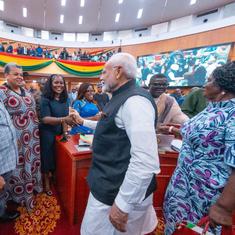Climate activist Sonam Wangchuk seeks talks with Centre after being released from detention
Locals should be empowered in the Himalayas because they can best preserve it, he said after being allowed to visit Rajghat.

Climate activist Sonam Wangchuk on Wednesday said that he had given a memorandum to the Union government with a set of demands to protect Ladakh under constitutional provisions and seeking to resume talks within 15 days to address the residents’ immediate concerns, PTI reported.
Wangchuk made the statement shortly after he and 150 other protestors from the Union territory were released by the Delhi Police and allowed to visit Rajghat, the memorial for Mahatma Gandhi, The Indian Express reported. Wangchuk also said the group had ended their fast.
The group was detained at Delhi’s Singhu border on Monday night while marching to the national capital to demand constitutional safeguards for Ladakh. On Tuesday, they launched an indefinite fast at the police stations where they have been held.
“We have given a memorandum to the government to protect Ladakh under such constitutional provisions so that its ecology can be preserved,” Wangchuk told reporters after visiting Rajghat on Wednesday. “In this case, it is the Sixth Schedule, which gives locals the right to govern and manage the resources.”
The Sixth Schedule under Article 244 (Administration of Scheduled Areas and Tribal Areas) of the Constitution of India guarantees certain protections for land and a nominal autonomy for citizens in designated tribal areas. In Ladakh, more than 97% of the population belongs to the Scheduled Tribes.
“Locals should be empowered in the Himalayas because they can best preserve it,” said Wangchuk. “I have received assurances from the Home Ministry that I will soon meet with India’s highest leadership – the prime minister, the president or the home minister.”
The group was earlier released on Tuesday night. But they were detained again because they wanted to continue their march towards central Delhi.
The march had started from Leh on September 1 and was scheduled to culminate at Rajghat on October 2. It was organised by the civil society groups Leh Apex Body and the Kargil Democratic Alliance.
They are demanding statehood for Ladakh, its inclusion under the Sixth Schedule of the Constitution, job reservation for locals and two Lok Sabha and one Rajya Sabha seats for the region.
On August 5, 2019, the Bharatiya Janata Party-led Union government rescinded the special status of Jammu and Kashmir under Article 370 of the Constitution and bifurcated the state into the Union territories of Jammu and Kashmir, and Ladakh.
This, along with the lack of a legislature in Ladakh, has led to increasing insecurities among the residents of the Union territory about their land, nature, resources and livelihoods and stoked fears that the region’s cultural identity and fragile ecosystem may be in jeopardy.
On Wednesday, an unidentified police officer told PTI that Wangchuk and the other protestors “were allowed to go after an assurance from them of not gathering or holding any yatra”.
The police officer noted that prohibitory orders were enforced in the national capital on Monday for six days till October 5.
Wangchuk had also undertaken a 21-day hunger strike ahead of the Lok Sabha elections in March demanding statehood for Ladakh and the protection of the Himalayan ecology.
Also read: Explained: Why Ladakh is up in arms again









